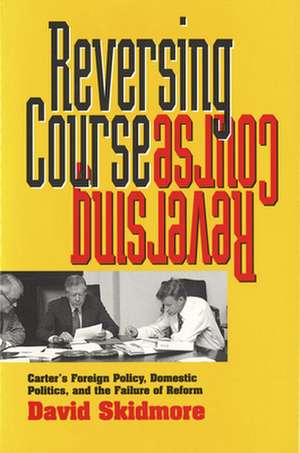Reversing Course: Carter's Foreign Policy, Domestic Politics, and the Failure of Reform
Autor David Skidmoreen Limba Engleză Hardback – 31 dec 1995
In "Reversing Course," David Skidmore argues that President Carter's initial foreign policy agenda required a scaling back of U.S. commitments abroad, reflecting a decline in resources, as well as influence, in a world developing in ways necessarily reducing U.S. hegemony. By probing beneath the obvious and carefully sifting the abundant but poorly understood evidence, Skidmore finds at the root of Carter's failed effort an irresistible pressure to reverse a liberal foreign-policy agenda in order to address the effect at home of well-organized conservative criticism. For Skidmore, Carter's course "reversed" toward a traditional containment strategy vis-a-vis the Soviet Union not because of Soviet intransigence or faulty idealism but because Cold War politics sold better in the polls.
While offering significant theoretical arguments, Skidmore carefully anchors his thesis in the day-to-day political give and take among those personalities and events that provoked headlines and commentaries long before they were the stuff of history. Among the telling factors and events analyzed in this book are the Vance/Brzezinski conflict, the support and opposition of Howard Baker, the SALT II Treaty, the Panama Canal Treaties, and the Soviet occupation of Afghanistan, to mention only a few.
Although Skidmore draws conclusions that apply to the Reagan, Bush, and Clinton administrations as well, his focus is not on personality but on theory and underlying structures. He provides a demonstration that this structural approach can "be helpful not only in unraveling the mysteries of policy change under Carter but also in specifying the underlying sources of policy vacillation over much of the past two decades." .
Preț: 466.91 lei
Preț vechi: 606.38 lei
-23% Nou
89.36€ • 92.82$ • 74.22£
Carte tipărită la comandă
Livrare economică 03-17 februarie 25
Specificații
ISBN-10: 0826512739
Pagini: 248
Dimensiuni: 161 x 237 x 26 mm
Greutate: 0.56 kg
Ediția:New.
Editura: Vanderbilt University Press

















